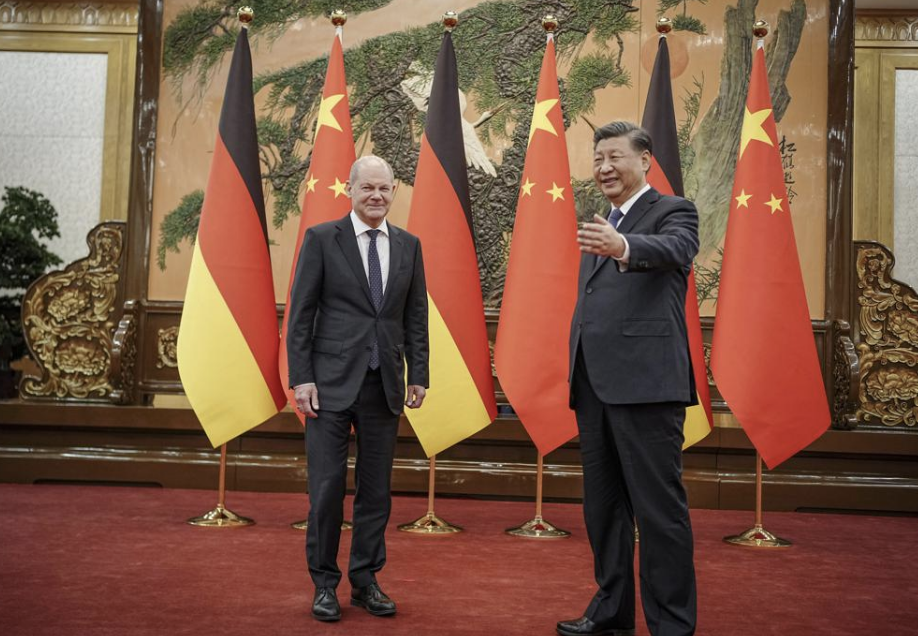German Chancellor Sided with China and Put Business First During Friday's Beijing Visit
Chinese President Xi,right, and German Chancellor Scholz,left. Photo: Kay Nietfeld/AP
On Friday, Nov. 4, German Chancellor Olaf Scholz and top executives visited Beijing to meet with President Xi Jinping, who assured mutual cooperation to speed up the approval process for the BioNTech vaccine in China in exchange for a green light for Chinese vaccines in the EU.
German Chancellor Scholz's trip marked the first visit to China by any European Union leaders since the Russo-Ukrainian war or any G7 leaders since the coronavirus pandemic. Following Scholz to Beijing are a group of top executives from German corporations, which shows the business implications of this trip aside from the obvious geopolitical significance. Scholz said that China agreed to approve BioNTech SE's vaccine in exchange for Chinese vaccines' availability in the European Union. Moreover, China signed an order to buy 140 Airbus SE jetliners for 17 billion dollars, according to the Chinese State Agency and Airbus Spokesmen.
In response to Scholz's visit to China, the Biden administration urged the German Chancellor to carry the allies' message regarding China's coercion against countries such as Taiwan and other actions that the Western allies have objected to. The response from the U.S. National Security Council mirrored the common concerns of Western leaders and German politicians regarding the Beijing trip. The international skepticism questions if Scholz is increasingly leaning towards China's regime.
U.S. State Department officials said Wednesday that the Biden administration is opposed to China's permission to get a controlling stake in the Hamburg Port Terminal after overhearing the China Ocean Shipping Co.'s trading deal that Chancellor Scholz pushed despite opposition from six key ministers. The deal will allow the state-owned Chinese company to buy a stake in a container terminal. With more trading deals between China and Germany after Scholz's visit, it becomes clear to Western leaders that the German Chancellor is putting Germany's economic interest above concerns over CCP's regime.
Domestically, Scholz's China trip also raised doubts from beyond the six ministers who opposed the COSCO deal. Experts say Scholz's trip will contravene the government's foreign relations strategy while endangering EU unity. A poll conducted by German public broadcaster ARD found that over half of respondents want decreasing economic cooperation with China, with 63 percent saying China is a threat to global security. The domestic popular opinion dramatically differs from Scholz's stance when he highlighted the importance of maintaining economic cooperation with China for Germany as he arrived in Beijing. Several officials, including German Foreign Minister Annalena Baerbock, also expressed concern over Germany's over-reliance on China in advance of this trip.
Delegates from both China and Germany during the meetings. Photo: Kay Nietfeld/AP
Amidst a backdrop of domestic and international skepticism, Scholz's choice of delegation and his stance alongside President Xi of China send a strong signal of what lengths the German Chancellor is willing to go for economic interests. A day before Scholz's departure, foreign ministers from G7 opened a two-day meeting in Münster, Germany, to express caution and the best course of action over the Beijing visit. Yet Scholz neither adopted the strategy nor chose any foreign relations officials. The delegation from Germany included CEOs from chemical giant BASF SE, financial conglomerate Deutsche Bank AG, and car maker Volkswagen AG. In the meantime, Scholz said Germany should "change the way it deals with China" after he and President Xi collectively discussed their geopolitical stance for the press.
Scholz's visit, completed by business delegates from both sides, signals a window to observe the chancellor's willingness to pursue Beijing's independent policy in exchange for economic benefit despite the opposition of Western allies, domestic popular opinions, and members of the cabinet. A closer relationship between Beijing and Germany, Europe's biggest trader and investor with China, will undoubtedly put a shade over the EU's capability to talk to Beijing in a single voice from a united front.
For Scholz, he will need to navigate Western leaders' questions over strategy as he returns to Germany. For Germany's aviation and pharmaceutical business, the deals made during this trip opened a window of opportunity. As for China, whether the potential stronger alliance in Europe will pan out depends on Scholz's support in the future. Max Zenglein, the chief economist at the Mercator Institute for China Studies, said, "Germany's not yet executed reorientation of its China strategy are empty words for now."


